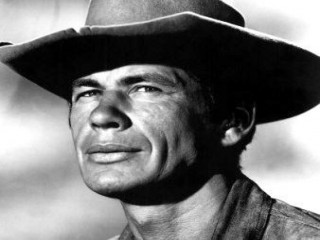
Charles Bronson biography
Date of birth : 1921-10-03
Date of death : 2003-08-30
Birthplace : Ehrenfeld, Pennsylvania, U.S.
Nationality : American
Category : Arts and Entertainment
Last modified : 2011-09-14
Credited as : actor, Once Upon a Time in the West, Hollywood box office
1 votes so far
Bronson grew up in the coal mining town of Ehrenfeld, Pennsylvania, in the poorer part of the area called Scooptown. One of 15 children, he grew up in harsh conditions and experienced extreme poverty. His parents had immigrated to the United States from Lithuania to work in the mines. Bronson, whose given name was Buchinsky, lost his father when he was ten years old. When he was 16, he joined his older brothers working in the coal mines.
In 1943, Bronson was drafted into the Army. First stationed in Kingman, Arizona, Bronson soon found himself part of the 760th Flexible Gunnery Training Squadron. He was stationed in Guam, and took part in regular bombing raids on Japanese territories. When he returned home he floated from job to job, from bricklayer to cook to onion picker. A chance meeting with some actors from Philadelphia gave him his introduction to theater and acting.
Spurred on by hopes of earning the high salary paid to film actors, Bronson moved to California and joined the Pasadena Playhouse. He took acting lessons and acted in several plays. In 1951, he earned a small role in the film You're in the Navy Now starring Gary Cooper. In that film he was billed as Charles Buchinski. By 1954, he had officially changed his name to Bronson. The impetus for his name change was a fear that his Slavic sounding name would bring him unwarranted attention from the House Un American Activities Committee, which was busily blacklisting members of the Communist Party in Hollywood circles at the time.
Throughout the 1950s Bronson appeared in numerous guest roles on television including TV Westerns like Bonanza, Big Valley, Gunsmoke, and Rawhide. He also took on small roles in films including one as the laboratory assistant to Vincent Price in the horror movie The House of Wax. His role in the 1958 film Machine Gun Kelly brought him some recognition, but it was not until the 1960s that Bronson began appearing in more substantial roles. Unfortunately, with co stars like Steve McQueen, Richard Burton, and Yul Brynner, Bronson found it difficult to move into the limelight despite turning in credible performances.
In 1960, Bronson starred as one of seven mercenaries hired to protect a Mexican village from bandits. The Magnificent Seven, a remake of Japanese director Akira Kirosawa's Seven Samurai, was an incredible success but Bronson was overshadowed by his co stars. His roles in later films like The Great Escape, The Sandpiper, Battle of the Bulge, and The Dirty Dozen also earned critical acclaim but starring roles seemed to elude him.
In 1968, Bronson went to France at the request of French actor Alain Delon who had seen Bronson in Machine Gun Kelly and wanted to make a film with him. It was a bold step that ended up paying off for Bronson. He and Delon starred in the film Adieu l'ami, which became a hit in Europe. Bronson starred in several other films made in France, Italy, and Spain, including the Spaghetti western Once Upon a Time in the West. His European films made him an unlikely sex symbol with nicknames that translated as "The Brute" and "Sacred Monster." In 1972, he was named by the Hollywood Foreign Press Association as the number one box office attraction in the world outside of Hollywood. The previous year he had received a Golden Globe award for most popular actor in the world.
Well into his 50s and a European icon, Bronson returned to the United States in the mid 1970s to become a major Hollywood film star. In 1974 he starred in Mr. Majestyk as a farmer fighting against the thuggish practices of men who want to run him off his property. Playing a good man who is pushed too far and fights back violently was a theme continued in his other film of 1974 Death Wish. Seeming to hit the tenor of the time, his character was widely cheered by crowds who lived vicariously through him. Muggers, thieves, and a wide range of other criminals faced death at the hands of Bronson's Paul Kersey. When critics roundly criticized the violence, Bronson remained unfazed.
Bronson's film career continued into the 1980s, but his popularity waned and actors such as Arnold Schwarzenegger and Sylvester Stallone replaced him as leading action heroes. In the 1990s most of his roles were in television with the exception of Death Wish V, which was released in 1994, and a small but touching performance in The Indian Runner, directed by actor/director Sean Penn. His final performance came in 1999, in the television drama Family of Cops III, the third installment of a trilogy of television movies made starring Bronson as the patriarch of a family of police officers.
Bronson divorced his first wife, actress Harriet Tendler, in 1968 and married actress Jill Ireland. Bronson and Ireland were married until 1990 when she died of cancer. In 1998, he married Kim Weeks, who survives him along with his four children, two stepsons, and two grandchildren. Bronson may be remembered most for his violent action films like the Death Wish series, but he was also part of some of Hollywood's classic Western and military films of the '60s. An unlikely sex symbol, Bronson's popularity spanned decades and continents. He died on August 30, 2003, in Los Angeles, California, at the age of 81.
















